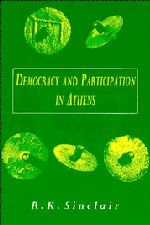Book contents
- Frontmatter
- Contents
- Preface
- Maps
- 1 The Athenian polis and the evolution of democracy
- 2 The privileges and the opportunities of the citizen
- 3 The responsibilities of the citizen
- 4 The sovereignty of the Demos, officials and the Council
- 5 Citizens and participation
- 6 The hazards of leadership
- 7 The rewards of leadership
- 8 The critics of Athenian democracy
- Appendix 1 The population of Athens
- Appendix 2 ‘Working days’
- Appendix 3 Notes on three constitutional matters
- Bibliography
- Index
2 - The privileges and the opportunities of the citizen
Published online by Cambridge University Press: 01 June 2011
- Frontmatter
- Contents
- Preface
- Maps
- 1 The Athenian polis and the evolution of democracy
- 2 The privileges and the opportunities of the citizen
- 3 The responsibilities of the citizen
- 4 The sovereignty of the Demos, officials and the Council
- 5 Citizens and participation
- 6 The hazards of leadership
- 7 The rewards of leadership
- 8 The critics of Athenian democracy
- Appendix 1 The population of Athens
- Appendix 2 ‘Working days’
- Appendix 3 Notes on three constitutional matters
- Bibliography
- Index
Summary
Athenian attitudes to citizenship
The question of who were entitled to be Athenians in the fullest sense had, as we have seen, caused bitter controversy in the years after the expulsion of the tyrant Hippias in 510. Kleisthenes opposed the use of rigid investigation in settling disputes about an individual's origins and status and his reforms instituted a different mechanism for deciding acceptance as an Athenian. Henceforth, Athenian citizens were those descended from Athenian men who had been registered in the Kleisthenic demes at the end of the sixth century, and it was the responsibility of the demes to keep a register of their citizen members.
In 451/0, the Athenian assembly accepted Perikles' proposal to require Athenian parentage in the female as well as the male line as the basis for citizenship. The motivations of this proposal and its acceptance have been much disputed. Athens and its busy port Peiraieus were clearly attracting many foreigners to Attike – men in particular, it is likely, but women and families as well. With the marriage of foreign women into Athenian families, some Athenian fathers may have entertained fears of finding it difficult to marry their daughters to Athenian citizens, especially in the wake of Athenian war losses in the mid-450s. Athenians at large may have felt themselves confronted by a flood of outsiders, and, in particular, may have been unwilling to share, on an unrestricted basis, the opportunities that Athens now offered.
- Type
- Chapter
- Information
- Democracy and Participation in Athens , pp. 24 - 48Publisher: Cambridge University PressPrint publication year: 1988
- 1
- Cited by

